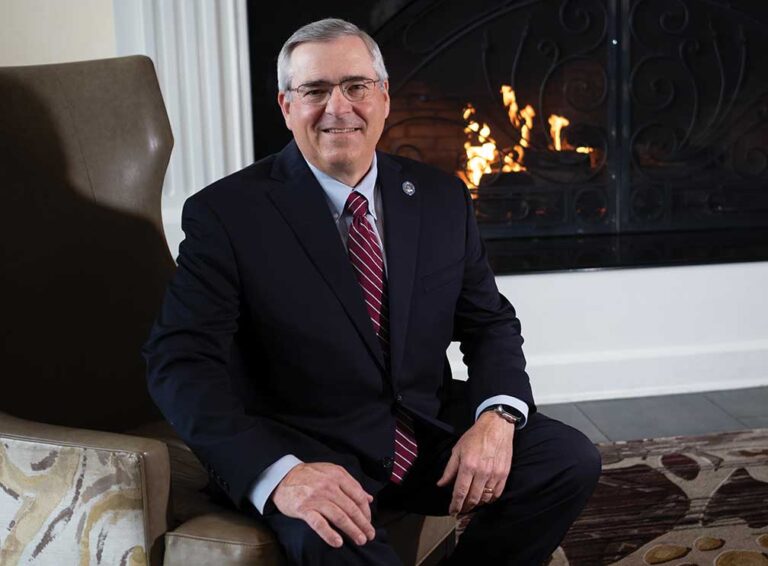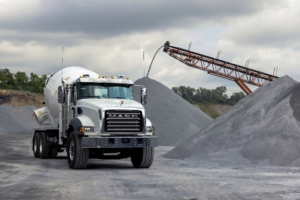What changes will 2025 bring? That question is probably top of mind for anyone in the trucking industry, from the driver’s seat all the way to the C-suite. With a new administration stepping into power at the White House and the fate of key pieces of legislation hanging in the balance, one thing’s for sure. The Truckload Carriers Association (TCA) will continue to amplify the voice of the truckload industry on Capitol Hill. And, according to TCA Chairman John Culp, motor carriers throughout North America will keep doing what they do best — move freight from Point A to Point B (and often Points C, D and E, as well) as efficiently and safely as possible. Read on as Culp shares a few insights about factors impacting the industry.
Good afternoon, Mr. Chairman. It’s good to visit with you again! As we bid farewell to 2024 and embark on a new journey in 2025, what are your thoughts on the state of the freight industry?
Most of us would agree that 2024 was a challenging year for the trucking industry as much of the industry has been operating below cost. The cost increases seen in transportation are very real, but keep in mind that depressed rates can only last so long. The economy is bouncing back — and trucking is resilient.
Even though consumers were still cautious during the last quarter of 2024, we saw a definite uptick in consumer demand and spending leading up to the Christmas holidays, particularly on Black Friday and Cyber Monday. We are a consumer-driven society, and that will always be a positive thing for trucking.
A lot of financial analysts noted that the third quarter of the year wasn’t that great compared to 2023, but we did see some of the first positive year-over-year reports. That’s a start. I believe we’re going to see improvement in most industries, and in trucking in particular, during the first half of 2025.
We’ve still got challenges to face, but I think the pendulum is starting to swing in our favor.
We have a new administration in Washington, effective with the swearing-in of President Donald Trump this month. According to reports I’ve seen, “Trump 2.0” is going to involve some pretty big policy changes. With Trump’s support of the oil and gas industry, do you see any possibility for changes in the Environmental Protection Agency’s (EPA) zero-emissions regulations and timeline?
There’s a lot of attention on that right now. I anticipate that, at a minimum, the EPA’s timeline will be pushed back — and that will give the industry some breathing space.
The general public, as well as many environmentalists, view the trucking industry as being one of the biggest contributors to air pollution and global warming, and even as being indifferent to environmental issues. Can you comment on this perception?
First of all, it’s important to note that the trucking industry very much wants to be environmentally responsible; however, we feel strongly that we need a long-term comprehensive strategy that achieves our common objectives in a realistic, economically responsible way. Zero tailpipe emissions are simply not feasible in the truckload business.
Still, we’re seeing a big push for electrification of both passenger and commercial vehicles from environmental groups as well as from vehicle manufacturers. What are some viable options to electric engines?
People are beginning to understand that there ARE alternative fueling solutions that need to be explored. We’ve seen a lot of progress with renewable diesel using current internal combustion engines. Options like this can move the emissions needle a lot better than full-scale adoption of electrification — and in a much more affordable and sustainable manner.
It’s going to be very interesting to see where it all goes.
At TCA’s Fall Business Meetings just a few months ago, we heard from a representative of the EPA. It was a very productive session, and I believe the feedback TCA members gave the EPA about the feasibility of the impending emissions standards were well received.
In short, our industry wants to do the right thing as far as the environment is concerned — but we want to do the right thing in the right way. I feel like we’ve got some momentum heading in the right direction.
With the implementation of Phase II of the FMCSA’s Drug and Alcohol Clearinghouse in mid-November, state driver licensing agencies are required to revoke the commercial driving privileges of any drivers in a “prohibited” status. How is this impacting the driver pool?
I haven’t seen any specific numbers on drivers who were downgraded, but it’s just common sense to assume that there were quite a few drivers flying under the radar who shouldn’t have been behind the wheel of a truck because of drug and alcohol violations. Now they can’t slip through the system and go to another state and apply for a job, because information from each state is submitting data to the Clearinghouse.
The Drug and Alcohol Clearinghouse regulations are a good thing. Making sure we have drug- and alcohol-free professional drivers in commercial vehicles makes the road safer for everyone. For drivers who are prohibited from operating a CMV due to a violation, there is a return-to-duty process for them to pursue if they want to remain in the industry.
Finding — and keeping — qualified drivers must be more important than ever for motor carriers. Do you have any advice for hiring managers and company executives?
In short, though, company culture is the most important factor when it comes to driver retention. Drivers want to be heard and know that they are valuable members of the company. That doesn’t mean you can give them everything they want or that drivers shouldn’t be held accountable for their performance. But even if you can’t give drivers exactly what they want, you can let them know that you truly hear their concerns.
Most importantly, you’ve got to be honest with your drivers. They want transparency; they want open communication.
Drivers leave a company for many different reasons — pay, routes, benefits — but if your drivers feel that they are valued and that management cares about them and their needs, that’s when you build retention.
The Biden administration’s Bipartisan Infrastructure Law, or BIL, is set to expire in September, and the administration made a flurry of allocations in late 2024 for various projects. While progress has been made in many areas, improvements to truck parking availability around the nation don’t seem to be happening at the rate that’s needed. What are your thoughts?
Truck parking remains an issue for the industry, and like most problems, it’s not going to be solved overnight. This is one of the primary issues TCA is working very hard to make improvements on at the federal level. However, there are some positive things happening in Washington as far as the need for safe parking for our drivers. I’m encouraged.
Access to truck parking isn’t just about productivity, even though data shows that each driver spends an average of 56 minutes looking for parking on a daily basis. That’s nearly an hour of lost time every single day! It’s also a matter of safety for our drivers, as well as the general motoring public.
TCA will continue to advocate for additional truck parking, and as private businesses work to offer solutions, we will make progress.
Are there other issues you’re hoping will be addressed by Congress in the near future?
The attack on the independent contractor model (IC) at both the state and federal levels is very much at the forefront of the trucking industry right now.
For so many people, the American dream is to be independent business owner. In the trucking industry, that means owning your own truck and having some control over how you run your business. As with any system, there have been “bad actors” that haven’t done things the way they should, but the IC is most definitely a valid business model; it has been for years. I hope that together we can make sure it remains a viable option and opportunity for drivers. It is vitally important to our industry.
Overall, what do you believe the future of trucking will look like under the new presidential administration?
Any time there’s an administration change in Washington there will be some degree of uncertainty.
The most important thing for TCA to do is to work with whoever is leading the nation and to continue to advocate and advance the issues that are important to our industry.
We will continue to do just that and work for our members to address our business challenges and to work to improve the driving job, and by doing this, to make our industry stronger. You can count on this: TCA will fight and battle every day for the truckload industry and provide value to our members.
I’m optimistic that we will see opportunities for some successes in 2025.
On a different topic, TCA’s annual convention is coming up in just a couple of months. Can you share any details about this year’s agenda?
Truckload 2025: Phoenix is scheduled for March 15-18 at the Phoenix Convention Center. It’ll be great to see some sunshine and warm temperatures after the winter!
A large part of TCA’s value is helping members be financially sustainable. We’ve got some important educational sessions and panel discussions lined up, and there will be great benchmarking opportunities. In short, it’s all about making the trucking industry better.
Convention is a wonderful time for trucking industry professionals to gather together, share industry insights and, of course, enjoy a bit of socializing and networking. If you haven’t already registered, don’t waste any more time — visit tcaconvention.com to sign up and see the agenda.
Can you tell me a little about this year’s speakers and entertainment?
On Monday morning (March 17), Bob Costello, the American Trucking Associations’ chief economist, will present the 2025 Industry Economic Review. The entire industry is looking forward to better times ahead, and this session will help us make the most of the changes on the horizon.
This year’s keynote speaker is Oz Pearlman, a renowned mentalist, magician and athlete. It promises to be very entertaining! And our featured speaker, Jeremy Gutsche, will share insights and tips on how to harness the power of AI in your business.
To cap off the event, attendees will be treated to a private performance by the Gin Blossoms after Tuesday night’s closing banquet and awards ceremonies.
As we close, do you have any additional thoughts to share with TCA members?
On behalf of TCA’s leadership and staff, I’d like to thank our members for their continued participation and support. As an industry, we continuously work to keep the nation’s supply chain moving, regardless of the economy.
Change is always on the horizon, but we will continue to work hard and to do what we do. The nation depends on us.
To borrow an old phrase, we will “keep on truckin’.”
Thank you, Mr. Chairman. It has been a pleasure visiting with you.
Linda Garner-Bunch has been in publishing for more than 30 years. You name it, Linda has written about it. She has served as an editor for a group of national do-it-yourself publications and has coordinated the real estate section of Arkansas’ only statewide newspaper, in addition to working on a variety of niche publications ranging from bridal magazines to high-school sports previews and everything in between. She is also an experienced photographer and copy editor who enjoys telling the stories of the “Knights of the Highway,” as she calls our nation’s truck drivers.







